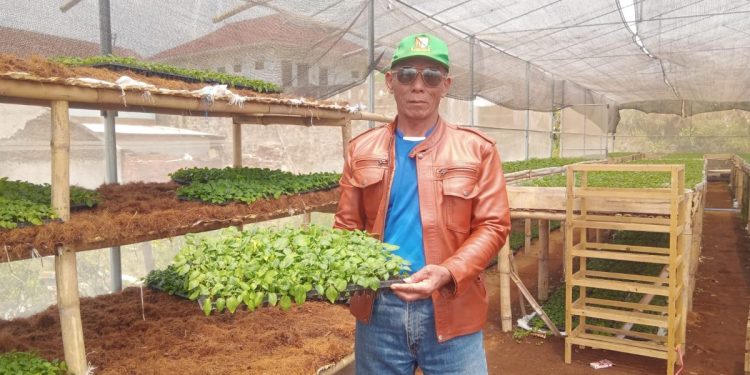#AgriculturalInnovation #PotatoFarming #SustainableAgriculture #FarmersEmpowerment #GranolaLPotatoes #RuralDevelopment #CommunityFarming #IndofoodCollaboration #FarmersMarket #AgriculturalDiversification
Explore the groundbreaking agricultural innovation in Cihawuk Village, where the head of the village, H. Yaya Dores, is steering the local farming community toward a brighter future. By shifting from traditional potato farming to cultivating Granola L, a disease-resistant and high-demand variety, Cihawuk is setting new standards in potato agriculture. This article delves into the challenges faced by farmers, the benefits of Granola L, and the visionary approach of the village leader.
In the picturesque village of Cihawuk, nestled in the highlands of Kertasari, Bandung, a farming revolution is underway. The village, located at an altitude exceeding 1500 meters above sea level with a cool mountainous climate ranging between 16 to 20 degrees Celsius, provides an ideal environment for cultivating various vegetables, including carrots, small chili peppers, green onions, cabbage, cauliflower, and tomatoes. However, it’s the humble potato that has taken the spotlight, thanks to the innovative efforts of the village head, H. Yaya Dores.
Cihawuk’s fertile land, situated near the Kendeng Mountains and bordered by Mount Papandayan to the south and Mount Wayang Windu to the east, has long been a vegetable supplier to major cities like Jakarta, Bandung, and Semarang. Every day, dozens of trucks transport a plethora of vegetables to these urban centers, meeting the increasing demands of the market.
Notably, Cihawuk’s potatoes have found a significant market in PT Indofood, a renowned food processing company. The collaboration between local farmers and Indofood has been fruitful, with almost 80% of the Atlantis variety potatoes harvested in Cihawuk being utilized by Indofood for products like chips and other potato-based foods.
However, the traditional Atlantis variety, while good for processing, faces significant challenges, especially during the rainy season. These challenges, including susceptibility to diseases, have led to financial burdens on farmers, particularly if crops fail. Witnessing the struggles faced by the farming community, H. Yaya Dores initiated a visionary plan to diversify potato farming.
The answer came in the form of Granola L, a robust and disease-resistant potato variety. Unlike Atlantis, Granola L exhibits resilience against diseases, ensuring a more stable yield for farmers. Moreover, the market value of Granola L potatoes is significantly higher, creating a lucrative opportunity for the local farmers.
With a keen focus on improving the lives of potato farmers, the village head implemented a subsidy program. Farmers interested in cultivating Granola L receive a 50% subsidy on the purchase of seedlings. This initiative not only empowers local farmers but also safeguards them from potential debts in case of crop failure. Furthermore, the village strictly regulates the sale of Granola L seedlings outside the region, ensuring the sustainability of this innovative approach.
Cihawuk’s ambitious plan doesn’t end here. The village head envisions a grand harvest festival in September next year, aptly titled “From Farmers to Farmers.” This event will empower farmers, offering them both agricultural knowledge and marketing skills. The harvested potatoes will be marketed by the local farmers’ group, providing them with a direct link to consumers.
Cihawuk Village’s innovative leap in potato farming signifies a significant milestone in sustainable agriculture. By embracing Granola L and empowering local farmers, the village is not only ensuring economic stability but also promoting a resilient and thriving agricultural community.







